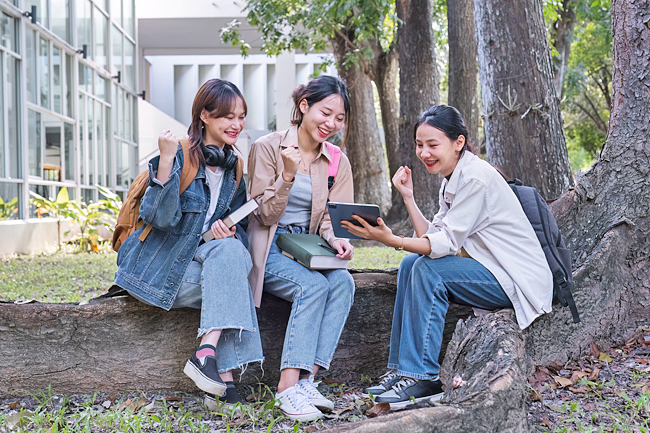ANN/CHINA DAILY – “In my dormitory during each final exam period, you can hear the rhythmic beats of electronic Chinese temple blocks. If you were to judge solely by the sounds, it would be hard to distinguish whether you were in a dorm room or a temple,” said student Wu Xinyue at Zhejiang Chinese Medical University in Hangzhou.
The practise of tapping Chinese temple blocks, known as muyu, with the purpose of aiding individuals in cleansing their minds and enriching their spiritual journeys. Nowadays, young people have ingeniously merged this religious tradition with electronic technology, turning it into a novel method for relieving stress and seeking blessings.
“Wu is the first person in her dorm room to learn about and use the muyu app. You can either make the knocking by tapping the screen of the phone or tablet, or the app can generate the rhythm of knocking itself. Since Wu discovered this app, it has gradually replaced her usual rituals of praying for good grades by, for example, sharing lucky koi fish posts on her social media account. Whether it’s before an exam or when facing life’s challenges, Wu would instinctively tap on her phone for a sense of reassurance.
She believes that the significance of the electronic Chinese temple blocks lies not in solving difficulties but in bringing hope and motivation, thereby prompting action. “It’s more like we are striking ourselves instead of tapping on muyu,” she said. “All positive outcomes stem from our own efforts.”
In the realm of online shopping, a burgeoning type of product is extending conventional consumer expectations: Money can not only buy material possessions but also directly deal with emotions. As the traditional boundaries between the physical and the digital blur, the allure of these novel experiences is becoming stronger. Young people are starting to break down their emotional needs into keywords, typing them into search boxes.



Twenty five-year-old freelancer Guo Xing was having mental problems back in 2020 when she was facing the graduation season. This is usually the most stressful period for college students, when the uncertainty of the future and the gap between campus life and the real world often trap many students in a swamp of anxiety. Not having enough money to go to off-line therapy sessions, Guo purchased an online text-based psychological counseling service offered by Knowyourself, a WeChat public platform that shares psychological knowledge.
Following the guidance in the user interface of the service, Guo wrote down her anxieties and confusion and submitted them to the staff. Shortly after, she received a response that not only offered comfort and understanding but also included a task: to jot down three good things she accomplished each day before bedtime.
While it did go some way to alleviating her immediate anxieties, Guo found the long-term positive impact to be relatively limited. “Text-based communication restricts the ability of service providers to perceive consumers’ emotions and weakens the emotional support they aim to convey,” she said.
Liu Weidan, 19, and Gan Xingchi, 21, are both college students who have problems finishing their homework on time. They have purchased online supervision services from a Taobao store, which cost a few yuan for a day, about CNY40 for a week and about CNY200 for a whole month.
Gan finds the price reasonable, especially considering its effectiveness. “It’s very helpful for procrastinators like me,” she said.
Based on the learning plan provided by the customers, the online supervisor will send reminders at specific times, monitor their progress, and conduct occasional checks.
The reminders can be by text or audio, with audio reminders being slightly more expensive.
When noticing any signs of slacking, the supervisor will offer motivation, and will give praise after the customers successfully complete the plan.
“I’ve found that cultivating self-discipline is very difficult for me, and relying on external discipline seems to be a quicker route to achieving my goals,” said Liu, who has also been quite satisfied with the results of the supervision service and has even recommended it to her friends.
But Liu also realised that, as effective as it is, the service is not the ultimate solution. “I think the role of supervisors is similar to that of teachers. The outcome of someone’s study still largely depends on individual willingness to learn.”
With emotional support becoming a significant driving force behind the online purchases of youth, some young entrepreneurs with a keen sense of market trends and technology have capitalised on these commercial opportunities by turning emotions into a lucrative business.


